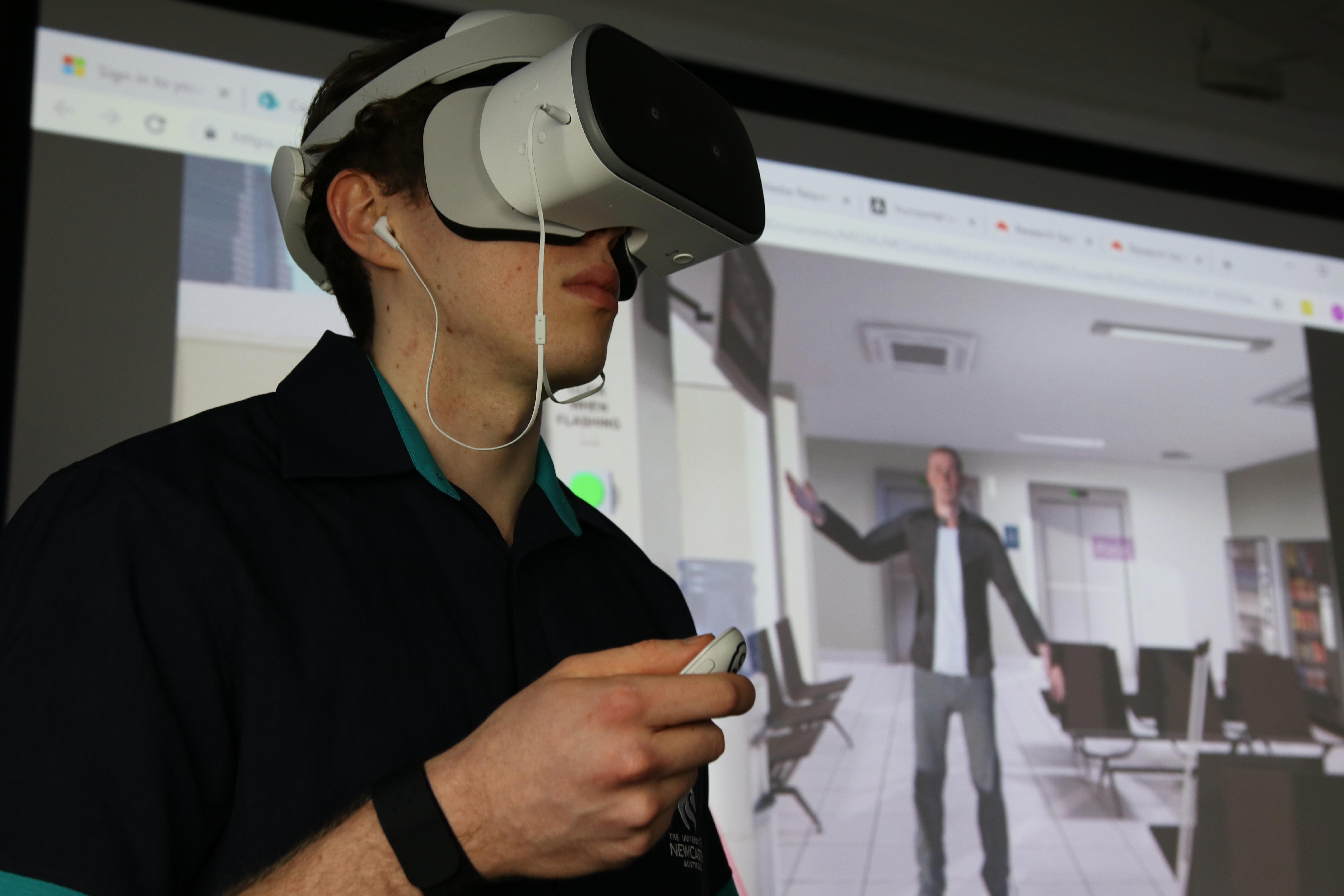Ground-breaking conflict simulator helps train budding nurses
A world-first virtual reality (VR) simulation is helping train nursing students at the University of Newcastle in conflict resolution.
The Conflict Resolution training VR program replicates a real-world emergency room and asks students to respond to a high-pressure mock scenario.
As part of the Bachelor of Nursing, students undertaking their mental health module are immersed via VR headset. Faced with ‘Angry Stan’, an avatar based on real-world interactions, users must remain calm and navigate a range of challenges to manage the situation.
The importance of developing resilience
The program, a collaboration between the School of Nursing and Midwifery and the University’s IT Services Innovation Team, is the first of its kind to respond to real-time biofeedback – for example the human heart rate. It gives second-year students a realistic insight into the clinical workplace where they can practise controlling their stress levels, managing conflict and building resilience in the classroom before entering the clinical environment.
"Working in an emergency environment can be incredibly demanding, with emotions running high and competing priorities,” said project lead and lecturer in the School of Nursing and Midwifery, Dr Donovan Jones.
“Knowing how to effectively diffuse an escalating situation while keeping a clear head can make a life-changing difference in emergency care, which is why we want to ensure our graduates are well-equipped with resilience training when entering the workforce.”
The evolution of Angry Stan
With more than 30 years’ experience in the field, Professor of Mental Health Nursing, Mike Hazelton, formed part of the team to develop Angry Stan based on his very real, lived-experience.
“Mental health nursing is an incredibly rewarding career, however it’s an environment where emotions can run high as you encounter people who are having possibly the worst day of their lives,” Professor Hazelton said.
“Stan represents someone health workers may come face-to-face with in an emergency environment. He is looking for his friend who has been brought in as a patient and is becoming increasingly agitated.”
Dr Jones added that the task at hand was to assess the situation and respond to Stan’s questions in a way which puts him at ease, alongside balancing competing priorities, whilst also maintaining a steady heartrate.
“Essentially, the calmer they remain, the easier Stan and the scenario is to deal with. Even if unprovocative responses are selected by the user, the wording is altered to be more provocative if the technology picks up from their heart rate that they are stressed,” Dr Jones said.
Emulating some of the challenges healthcare workers may face in their day-to-day job, Conflict Resolution is designed to develop resilience to ensure challenging situations can be managed.
“We support a zero tolerance for violence against healthcare workers, which is why it was imperative to develop an immersive training program where students can practise dealing with these potential situations in a safe, repeatable and realistic environment,” Professor Hazelton said.

The role of biofeedback in learning and teaching
Forging a reputation in VR, the University has developed an impressive portfolio of health-related training programs over the past few years, including the award-winning Neonatal Resuscitation and Road to Birth.
Unlike previous programs, Conflict Resolution is the first to incorporate the users’ biofeedback – in this case their heart rate.
“Traditionally, conflict resolution has been taught ad-hoc with textbooks and paid actors, which can be pretty uninspiring or very expensive,” IT Innovation Team Project Manager, Ms Vendela Pento said.
“What’s unique about the new program is the user is totally immersed in the scenario so we can build resilience in a whole new way.
“The days of teaching en masse are behind us. The qualitative and quantitative responses to the program actually help us learn from the students so we can tailor education to individuals, ensuring a deeper teaching and learning experience.”
Moving ahead with immersive teaching
Having been involved in the development of past VR scenarios, Dr Jones said the value of immersive teaching was clear.
“We’ve had huge success with the programs we’ve introduced so far, with student feedback showing the ability to repeat a scenario in the classroom or in their own time off site is extremely beneficial,” Dr Jones said.
“We now have a PhD student working on a research project to measure the success of Conflict Resolution and tailor the program as the needs of our students evolve.”
Looking at the bigger picture, Dr Jones stressed that the team was working towards ensuring the program would continue to be a valuable resource outside the higher education sector across the board.
“Equipping employees with ways to maintain their mental health should be of paramount importance. We realise that dealing with conflict in the workplace isn’t something that’s exclusive to healthcare. Moving forward, we’d like to explore gender roles and environments within Conflict Resolution to make it applicable to people working across a range of industries,” he said.
*The team comprises Dr Donovan Jones, Professor Mike Hazelton, Ms Shanna Fealy, Ms Theressa Lavender and Ms Vendela Pento.
Related news
- Don’t let perfect get in the way of good uni reforms
- From Delhi to Newcastle, full tuition scholarship makes STEM dreams come true
- Post‑mining research comes to life in community art exhibition
- Centuries-old coolabahs reveal how water and climate shaped the Gwydir Wetlands
- World-leading MRI upgrade boosts research capability at HMRI Imaging Centre
The University of Newcastle acknowledges the traditional custodians of the lands within our footprint areas: Awabakal, Darkinjung, Biripai, Worimi, Wonnarua, and Eora Nations. We also pay respect to the wisdom of our Elders past and present.